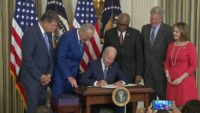The U.S. Chamber of Commerce has turned up the spotlight on U.S. infrastructure needs, proposing a plan to increase funding for highways, water, energy and other projects, and also to find more workers to carry out the work and require federal agencies to speed up project approvals.
The chamber has been a long-time infrastructure advocate, but its new plan, unveiled formally on Jan. 18, includes a particularly bold provision: a 25¢-per gallon increase in the federal gasoline tax, which now stands at 18.4¢.
Chamber CEO Thomas Donohue says the increase could be phased in, at 5¢ a year for five years, or take effect all at one time.
He notes that the increase would amount to a penny for each of the 25 years since the federal motor-fuels levy was last given a boost. “All we’re saying is, ‘Let’s catch up,’” Donohue said at a Jan. 18 press conference
The gas-tax hike is one part of the chamber’s proposal, which Donohue outlined at an infrastructure conference at its Washington, D.C., headquarters.
The plan also sees a role for private-sector financing and recommends expediting federal project reviews, by, for example, limiting the decision-making time for permit decisions to two years.
In addition, the proposal seeks to increase the construction workforce by such means as strengthened apprenticeship programs and by allowing immigrants to stay in the U.S. who have been shielded from deportations under two federal programs.
The Trump administration has called for an end to one of the programs, Deferred Action for Childhood Arrivals (DACA). Established by the Obama administration, DACA protects rom deportation undocumented immigrants who came to the U.S. as children.
The other program is Temporary Protected Status (TPS), established in 1990, which allows entry to the U.S. for people from specified countries after natural disasters or “an ongoing armed conflict.”
The Trump administration has announced it will end TPS for immigrants from several countries, including Haiti, El Salvador, Honduras and Nicaragua.
Donohue said that nearly 100,000 people covered by DACA and TPS work in the construction industry.
Other industry officials at the conference welcomed the chamber’s plan, including the American Road & Transportation Builders Association, National Stone, Sand and Gravel Association and Association of American Railroads.
Pete Ruane, ARTBA’s CEO, said that any new infrastructure initiative “must include a permanent solution to the Highway Trust Fund.”
He also said that the fuel tax is the “most transparent and effective way” of providing revenue for the fund.
The trust fund has been kept out of a deficit position through revenue infusions over the past decade from the general fund. Without new revenue, the fund faces a “disaster” as soon as two years from now, Ruane said.




Post a comment to this article
Report Abusive Comment